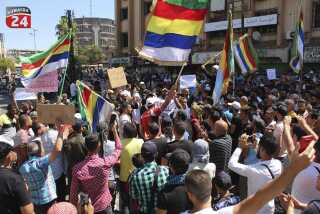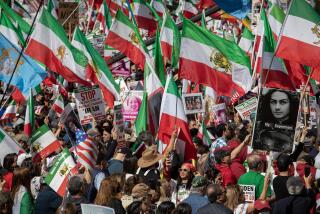Mass protests against government spread in Iraq
- Share via
Tens of thousands of protesters rallied across Iraq on Friday, charging that Sunni Muslims had been disenfranchised under the Shiite-led government of Prime Minister Nouri Maliki and pressing for detainees to be freed.
Protests have raged for weeks and continued even after the Iraqi justice ministry freed nearly a dozen female prisoners and said it would transfer others to jails closer to their homes. The unrest has spread from Anbar province, where infuriated protesters have blocked a key highway, to other Sunni strongholds across northern and western Iraq.
“How much longer will our children stay in prisons for no other reason than being Sunni,” a man who gave his name as Abu Abdullah told Agence France-Presse at one demonstration in Baghdad, where protesters hoisted banners calling for anti-terror laws to be repealed.
The rallies are a sign of continued volatility in Iraq and mounting problems for Maliki as his Sunni opponents accuse him of grabbing power and targeting Sunni leaders, most recently by arresting bodyguards assigned to a prominent Sunni minister. Chants heard during the Arab Spring revolts that toppled leaders in Egypt and Tunisia have been repeated at the Iraq rallies.
Former Prime Minister Iyad Allawi, one of Maliki’s chief opponents, called for him to step down in a statement read on Iraqi television, Bloomberg reported Friday. The push against Maliki has also been bolstered by powerful Shiite cleric Muqtada Sadr, who reached out to the protesters Friday by joining in prayer at a Sunni mosque, according to the Associated Press.
Maliki and his government have their “last chance for reconciliation,” Alaa Makki, who leads the Sunni Iraqiya bloc in parliament, told Al Jazeera. Protesters “are waiting for the government to send somebody there, representing the governmental concerns.”
The prime minister appears to be trying to head off clashes that could escalate the situation. In a statement Friday (link in Arabic), Maliki called on the armed forces and police to “exercise the utmost restraint” in dealing with protesters. He also asked demonstrators to stop “sectarian and terrorist groups” from infiltrating and sowing sectarian strife, “which if returned, God forbid, it will burn us all.”
Kurdish and Sunni sources told Reuters that Sunni Islamists are driving the protests in the hopes of creating their own semi-autonomous region akin to Kurdistan, emboldened by the belief that the ongoing uprising in Syria will ultimately tip the regional balance of power toward Sunnis.
The unrest comes ahead of elections slated for this spring. Sadr is believed to be making gestures to the Sunni protesters and religious minorities in order to style himself as a unifying figure ahead of the provincial vote.
ALSO:
Philippines may end hunt for treasures looted by Marcos
Japan sends envoy to South Korea in bid to reduce tensions
Malala Yousafzai, Pakistani teen shot by Taliban, leaves hospital
More to Read
Sign up for Essential California
The most important California stories and recommendations in your inbox every morning.
You may occasionally receive promotional content from the Los Angeles Times.










